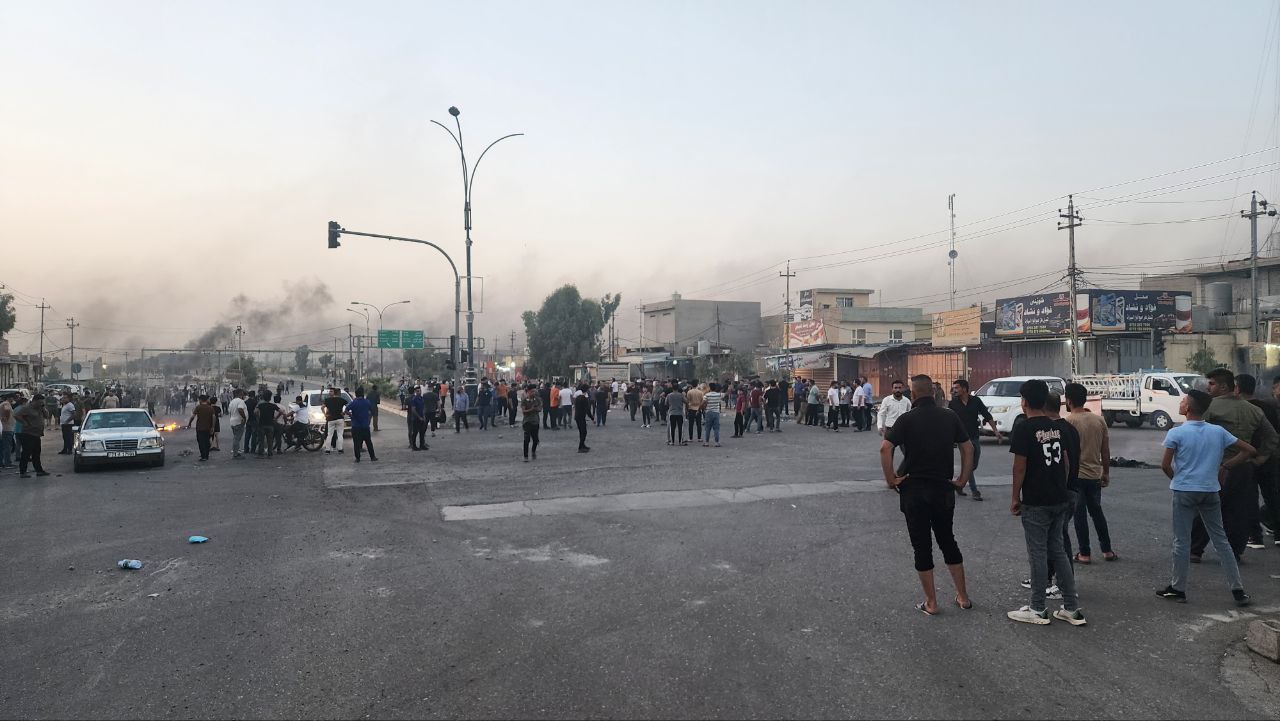Before noon today, September 2nd, I knew that a demonstration would take place in the Rahimawa neighborhood of Kirkuk. I knew some of the organizers of the demonstration, two of whom were already affected by the cut off of the Kirkuk-Erbil road.
Expectations were that the demonstration would last for an hour or two at most, but with its launch at 5 pm, things got out of control. National and partisan chants mixed with the demonstrations. Some of them were taking advantage of these chants to arouse the enthusiasm of the participants, but I did not see any of the organizers of the demonstration shouting political party-biased chants.
The organizers of the demonstration indicated in a brief statement that the aim of the demonstration is only to demand the reopening of the Kirkuk-Erbil road, which has been closed since August 27 by some Arab demonstrators supported by a political party who set up sit-in tents on the road.
The aim of the sit-in was to reject a decision by the Iraqi Prime Minister to hand over the Joint Operations Command headquarters in Kirkuk to the Kurdistan Democratic Party KDP. The headquarters is located on the main Kirkuk-Erbil road, in the Shoraw neighborhood, which is inhabited by Kurds. The headquarters was deserted by KDP following the events of October 16, 2017 and handed over to the Kirkuk Joint Operations Command, an umbrella for joint and military and security forces in the oil-rich city.
It took a short time and the two-way street of the Rahimawa neighborhood was blocked by demonstrators, which is less than two kilometers from where the Arab demonstrators were sitting. Tires were burned, and shortly after, the demonstrators headed towards the sit-in site in front of Joint Operations Command.
The demonstrators were of all ages, but most of them ranged between 30 and 40 years old, and among them were young men under the age of 18 who were shouting enthusiastic chants.
Some of them were on motorbikes, maybe they were just curious to know what was going on.
I can say that the number of demonstrators exceeded 3,000 people, but among them there were many who only wanted to watch the events distantly.
Almost 90% of those who were there were residents of the Rahimawa neighborhood. Their faces were not strange, and I saw most of them daily. In general, they were street vendors and students, and among them were also affiliated with the Peshmerga. Most of them were ordinary people whom do not have strong affiliations with the parties. Rather, they were affected or dissatisfied with the closure of the Kirkuk-Erbil road, but some of them fell under the influence of political and ethnic chants.
Video: Part of September 2nd demonstration. KirkukNow
Suddenly, the course of the demonstration changed and headed towards the headquarters of the Joint Operations Command. The security forces started shooting, at first it seemed as if the shooting was to disperse the demonstrators, but I myself saw five injured, some of whom were taken to the Rahimawa neighborhood on motorbikes. A person was injured due to gunshot wounds, and a short while later found out it was true.
The demonstrators headed to the sit-in site. Two vehicles were burned near the sit-in tents, and clashes erupted and stones were thrown. Some of the protesters left their places, then there was heavy gunfire, and the demonstrators began to withdraw gradually.
According to my sources, 10 people were injured, most of whom were shot and taken to hospitals, in addition to the death of a member of the Peshmerga, and three of the protesters were injured by stones.
This tension comes six days after the Erbil-Kirkuk road was cut off, while the Kirkuk administration and the Iraqi government were unable to find a solution to the problem.
The blocking of the road caused traffic disruption, which made it difficult for students to reach the examination halls and prevent traders and farmers from carrying out their work, while confusing the daily working hours of the employees.
It is not clear what will happen in the coming days, but a curfew was imposed in the city as a temporary solution, while the Iraqi Prime Minister and the Prime Minster of the Kurdistan Regional Government KRG called for an urgent solution to the situation in Kirkuk.
Muhammad Shia al-Sudani, Commander-in-Chief of the Iraqi Armed Forces, in a statement directed the security forces in the province to take their role in "establishing security and imposing the rule of law towards troublemakers in the province."
He also called on political parties and civil and popular society activists to "take their role in averting strife and maintaining security, stability and order in Kirkuk."
For his part, KRG PM, Masrour Barzani, called on the Iraqi prime minister to intervene immediately "to control the situation and protect the lives of citizens and demonstrators and not allow irresponsible people to escalate, exacerbate and complicate the situation more than it is now."
These events coincide with the preparations being made by the political parties and authorities in Kirkuk to participate in the elections for the provincial council elections to be held at the end of this year.





